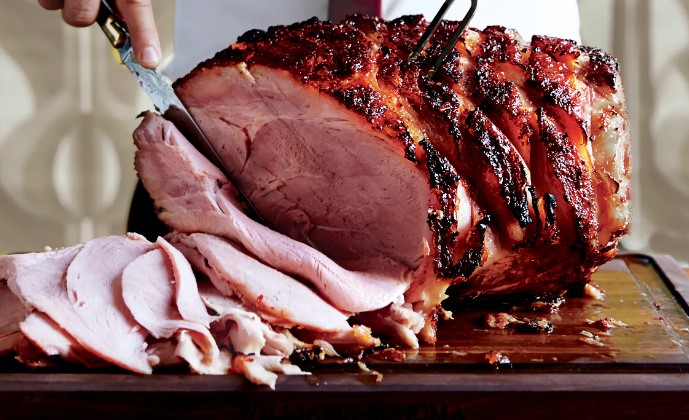Can Cats Eat Ham? What happens if a cat eats ham?
Ham, a delicious and savory treat for humans, can raise eyebrows when it comes to our feline companions. While tempting, is it safe for cats to indulge in this salty delight? This article dives deep into the world of cat nutrition, exploring the potential risks and benefits of ham for your furry friend. Follow Cat Memorial Stones !!
Is Ham Safe for Cats? Can ham kill cats?
In general, ham is not toxic to cats, meaning it won’t cause immediate harm if consumed in moderation. However, it’s not an ideal or highly recommended food for regular feeding. Ham, particularly the kind sold in stores, is often high in salt, fat, and preservatives—ingredients that can cause health issues for cats over time.

Nutritional Value of Ham for Cats
Ham is a form of pork, and it’s rich in protein, which is an essential nutrient for cats. Cats are obligate carnivores, meaning they require a diet primarily composed of meat. From that perspective, ham could provide some benefit due to its protein content. However, the drawbacks of ham outweigh its benefits when considering the overall health impact on your feline companion.
Here’s a closer look at the key nutrients in ham:
- Protein: Supports muscle development and energy.
- Fats: While some fat is necessary for energy, the high fat content in ham can lead to obesity in cats.
- Sodium: Cats require very little salt, and the excessive sodium in processed ham can lead to dehydration, kidney problems, and high blood pressure.
Why Ham is Harmful to Cats

- High Sodium Content: Ham is often packed with sodium, which can lead to serious health problems in cats. Excessive sodium intake can cause:
- Hypernatremia: A condition where there is an abnormally high concentration of sodium in the blood.
- Kidney disease: Sodium can strain the kidneys, leading to chronic kidney failure.
- High blood pressure: Sodium can elevate blood pressure, increasing the risk of heart disease and stroke.
- Fat Content: Ham, especially cured and processed ham, contains a significant amount of fat. While cats need some fat in their diet, excessive fat intake can contribute to:
- Obesity: Leading to joint problems, diabetes, and other health issues.
- Pancreatitis: A painful inflammation of the pancreas.
- Nitrates and Nitrites: Some types of ham, particularly processed ham, contain nitrates and nitrites, which can be harmful to cats. These chemicals can:
- Interfere with oxygen transport: Reducing the amount of oxygen that reaches the tissues.
- Increase the risk of cancer: Some studies have linked nitrates and nitrites to an increased risk of certain types of cancer.
What happens if a cat eats ham? Signs of Ham Poisoning in Cats
If you suspect your cat has eaten ham, it’s important to watch for the following signs of poisoning:
- Excessive thirst
- Frequent urination
- Vomiting
- Diarrhea
- Lethargy
- Weakness
- Difficulty breathing
If you notice any of these symptoms, contact your veterinarian immediately. Early treatment can be crucial in preventing serious health complications.
How much ham can a cat eat?
Cats can eat ham in small amounts as an occasional treat, but it’s important to keep it to a minimum due to the high salt and fat content. A pea-sized amount of cooked, lean ham is sufficient for most cats. Limit ham treats to no more than once or twice a week.
>>> Read: Can cats eat leeks? What to Do if Your Cat Eats Leeks?
How to Safely Feed Ham to Cats

If you still wish to treat your cat to a small bit of ham, it’s important to take precautions to minimize risks. Here are some guidelines to follow:
- Small, Occasional Portions: Only give ham as an occasional treat, and ensure it’s in very small amounts. This keeps the risk of health complications low.
- Low-Sodium, Unseasoned Ham: Opt for ham that is unsalted, unseasoned, and free of preservatives. The best option would be fresh, cooked ham with no added chemicals.
- Serve It Plain and Cooked: Ensure that the ham is thoroughly cooked to eliminate the risk of bacterial contamination. Avoid any raw or undercooked ham, as it may contain harmful bacteria like Salmonella.
- Monitor Your Cat: After giving your cat ham, monitor for any unusual reactions such as vomiting, diarrhea, or lethargy. If you notice any of these symptoms, consult your vet immediately.
Healthier Alternatives to Ham for Cats
Instead of ham, there are many cat-safe alternatives that provide better nutritional value without the associated risks. Some healthy, vet-approved options include:
- Cooked Chicken or Turkey: These are lean meats that are high in protein and much safer for cats. Make sure they are unseasoned and free from bones.
- Salmon or Tuna (in moderation): These provide essential omega-3 fatty acids and are highly appealing to cats. However, limit their intake as they can be high in mercury.
- Commercial Cat Treats: Specially formulated cat treats are a safer option, as they meet the dietary needs of your pet without the risks associated with human foods.
Conclusion: Should You Feed Ham to Cats?
While cats can technically eat ham, it is far from the best option for a regular part of their diet. The high levels of salt, fat, and preservatives make it a risky choice for your feline companion, especially in large amounts or as a frequent treat. If you do decide to feed ham to your cat, do so sparingly and opt for low-sodium, unseasoned varieties to minimize health risks.
Ultimately, your cat’s health is best supported by a balanced, species-appropriate diet of high-quality commercial cat food or fresh, lean meats approved by your veterinarian. When in doubt, always consult your vet before introducing new foods into your pet’s diet.
FAQs
- Can cats eat ham slices?
Yes, cats can eat ham slices, but it’s best to give it to them in moderation. While ham is a meat, it’s often high in salt and fat, which can be harmful to cats in large quantities. Additionally, some ham products may contain spices or preservatives that can upset a cat’s stomach.
- Can cats eat honey ham?
Cats should not be fed honey ham on a regular basis. Although cats are carnivores and ham contains protein, honey ham is often high in salt, sugar, and preservatives. These can be harmful to your cat’s health, including:
-
- Digestion: Causes digestive disorders such as vomiting and diarrhea.
- Heart: High salt intake can cause heart problems.
- Kidneys: Burden on the kidneys from having to process excess salt.
- Obesity: Sugar and fat can lead to weight gain and obesity.
- Can cats eat smoked ham?
Yes, cats can eat smoked ham in small amounts. However, it’s important to note that it should be given as an occasional treat, not as a regular part of their diet.
- Can cats eat turkey ham?
Yes, cats can eat turkey ham in moderation.
>>> Click Can cats eat cheese? Can cheese kill cats?
